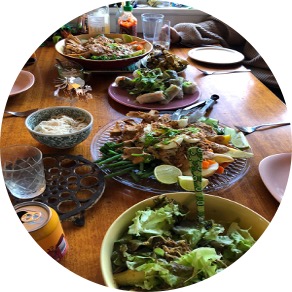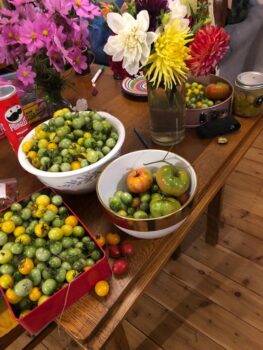
Armidale Food School is a series of workshops, panels and a reading group exploring how to change food habits to address climate change.
About this event
- 5 hours – These 5 sessions start at 10:00am and finish at 4:00pm. You can attend all sessions or choose individually. The seminars are FREE but limited to 10 persons per session. Register here with Eventbrite.
- Mobile eTicket – Food School REGISTRATION
What is Armidale Food School@ Black Gully?
As the climate crisis deepens, one main solution we have ready-to-hand is the widespread and holistic transformation of the agri-food system. While this is obviously related to food production and the marketplace (farmers and the major retailers), it also has a direct relationship with consumer habits. The need for convenience in the current economy still vastly outweighs slower more sustainable practices.
Rather than giving everyone a guilt trip for not buying organic food, Food School is a grassroots seminar series that gets us to think about one of the more unlikely factors troubling agricultural transition: time. We seek to share knowledge and encourage participants to holistically rethink their time-use in relation to food practices. This evidence-based seminar program draws on the basic idea that caring for the environment and each other in sustainable ways takes a different kind of time and attention that is not highly valued within the current economy. In addition, many of us are already time-poor. In these small seminars at Black Gully festival participants can expect to build skills to assist them to slowly change habits in real-time to aide in the collective transition to a new post-carbon economy.
The seminar series we offer at Black Gully Festival will examine a range of issues related to changing food habits (production and consumption) in relation to time in the contemporary fast-paced economy. The seminar series will run in a small gazebo and be limited to intimate groups of 10.
Food School was developed by Dr Nicolette Larder and Dr Jennifer Hamilton at the University of New England. They wrote about it here: “Making time to care differently for food: the case for the Armidale Food School”
BLACK GULLY FESTIVAL TIMETABLE:
1) Workshop: The Practice of Slowing Down (10am-11am)
In this session participants will be led through a series of activities to build a more mindful relationship with food. The presenter will share their experiences and practices of moving towards a more intentional and mindful relationship with food and open discussion on practical things we can do in our own lives to do the same. Participants will be led through a guided meditation to set the intention for the day.
Facilitator: Dr Michelle Jamieson
2) Workshop: Making time for food (11am-12pm)
Making time is one of the main challenges people have in shifting their food and life practices towards more caring food relations. In this session participants will explore the relationship between their own labour, housing costs and time and the way these shape their food practices. Participants will leave the session with practical ideas for how they might make more time in their own lives for more caring food relations, or at least understand more deeply why making time is hard.
Presenters: Dr Amy Lykins and Dr Nicolette Larder
BREAK: 12-12.30 Opening, Welcome to Country on Mainstage
3) Reading Group: Decolonising Food 12.30-13.30
Participants in this session will read together excerpts of new writing that describes the links between colonisation and agricultural practices, and explore current research that asks how we can address colonial harms and the unsustainability of the food system at the same time.
Readings: excerpts from Maria Puig de la Bellacasa, Matters of Care; Christopher Mayes, Unsettling Food Politics & Callum Clayton Dixon, Surviving New England (Handouts provided on the day)
4) Panel: Climate and Health 14.00-15.00
Eating well can improve our physical and mental health, growing and consuming well can mitigate climate change, farming sustainably can improve our mental health. In this session we explore the links between climate change and physical and mental health, and examine how making time for alternative food practices can actually solve many problems at once.
Presenters: Dr Sujata Allan, Dr Clara Murray, Dr Lucie Newsome
5) Workshop: Climate Change and Chores – 15.00-16.00
Domestic divisions of labour are intimately tied to most food practices. In your household: who does the shopping, cooking and, most importantly, the washing up? In what ways can a holistic rethink of these practices make for happier domestic lives and improve the environment? This workshop will provide a little history of queer and feminist thinking about housework and family, and will end with some exercises to reflect on home-making practices in relation to food and environment.
Facilitator: Dr Jennifer Hamilton
